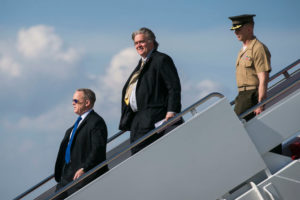Trump Exempts Entire Senior Staff From White House Ethics Rules
After a pointed exchange with ethics officials, the White House has released a list of waivers to Trump’s ethics rules—and Kellyanne Conway, Steve Bannon, and more are exempted.
LACHLAN MARKAY
05.31.17 10:55 PM ET
President Donald Trump has exempted his entire senior staff from provisions of his own ethics rules to allow them to work with political and advocacy groups that support the administration.
Staffers given a pass on those rules include White House counselor Kellyanne Conway, who has the green light to communicate and meet with “political, advocacy, trade, or non-profit organizations” that formerly employed her consulting firm, despite ethics rules that would otherwise bar work with former clients.
Chief White House strategist Steve Bannon also received a waiver to the rules as part of a blanket exemption for all White House appointees allowing them to communicate with the press. His reported discussions with former colleagues at the pro-Trump site Breitbart News, which Bannon chaired until last year, had raised red flags among ethics watchdogs.
Bannon and Conway will both be free to work with a network of political groups backed by the wealthy Mercer family, which was integral to Trump’s victory last year and continues to support his agenda as president.
The White House on Wednesday released a list of waivers to the ethics pledge imposed by a January executive order on all administration nominees and appointees. It agreed to do so only after a pointed exchange with federal ethics officials over the scope of their oversight authority.
Three former lobbyists in the White House, and one on the vice president’s staff, have also been exempted from “revolving door” rules imposed by that executive order, allowing them to work on administration policies that might benefit former clients.
The list provides the first official glimpse at the extent to which Trump has circumvented his own ethics rules by hiring former special interest advocates of the type that he railed against on the campaign trail.
But it does not cover the entire Trump administration and only discloses waivers granted to officials in the Executive Office of the President and the Office of the Vice President. The Office of Government Ethics had requested all waivers issued to appointees administration-wide, but it was not immediately clear whether those were to be made available by the White House or the applicable federal agencies.
The White House did not immediately respond to questions about further waiver disclosures.
The West Wing’s three former lobbyists have been given wide latitude to work on a range of policy issues that might dovetail with the interests of their former clients.
Energy policy adviser Michael Catanzaro—a former energy industry lobbyist with clients in the oil, gas, and coal sectors—“may participate in broad policy matters and particular matters of general applicability relating to the Clean Power Plan” and other Obama administration environmental rules.
“Particular matters of general applicability” generally refer to laws or regulations that affect a narrow and identifiable group—say, a single industry. In effect, Catanzaro will be free to promote policies that benefit his former clients as long as he doesn’t go to bat for them directly.
So too will Shahira Knight, a White House economist and former lobbyist for financial services giant Fidelity who can now “participate in broad policy matters and particular matters of general applicability relating to tax, retirement and financial services issues.”
Andrew Olmem, another White House economist and a former lobbyist for a host of large financial services and insurance firms, will be free to work with former clients on specific issues affecting bank capital requirements, financial regulation of insurers, and the Puerto Rican debt crisis, all issues on which he has recently lobbied.
Those officials have been given freer rein to advance their former clients’ financial interests, but ethics rules have also been waived for every other “commissioned officer”—staffers who report directly to the president—in the White House who has worked for a political group in the past two years.
That will allow a number of White House staffers to collaborate with pro-Trump advocacy operations. The West Wing is stacked with officials who have made significant sums working, consulting for, or representing high-profile political organizations, including networks of groups financed by the Trump-backing Mercer family and the libertarian Koch family.
Conway herself consulted for more than 50 political, policy, and advocacy organizations last year, according to a White House financial disclosure statement.
She and Bannon will be free to continue working with two campaign vendors in particular, Glittering Steel and Cambridge Analytica, that are key components of the Mercers’ pro-Trump political endeavors. Bannon helped lead both companies, and Cambridge Analytica enlisted Conway’s consulting services last year.
The White House also issued a collective waiver to six White House officials formerly employed by the law firm Jones Day, which has sent more than a dozen attorneys to the Trump administration, allowing them to meet and communicate with former colleagues representing the White House, Trump, his campaign, “or political entities supporting the president.”
The White House’s waiver disclosures came after a tense back and forth with the Office of Government Ethics. The White House initially disputed that OGE had the authority to demand a full list of waivers granted to administration appointees.
After OGE director Walter Shaub disputed those “highly unusual” claims, the White House agreed to disclose all ethics pledge waivers.
Disclosure was more regimented under a similar executive order imposed by President Barack Obama in 2009. That measure directed OGE to regularly update its website with a list of waivers to a similar ethics pledge—Obama granted 49 in total over eight years and across his entire administration—along with detailed explanations of why those waivers were in the “public interest.” No such explanations accompanied the Trump White House’s list.
Ethics watchdogs appeared nonplussed by the release on Wednesday evening.
“We now know who was given a waiver from their WH ethics pledge,” wrote the left-leaning group Citizens for Responsibility in Washington on Twitter. “Looks like the end of the drain the swamp illusion.”
In: dailybeast


